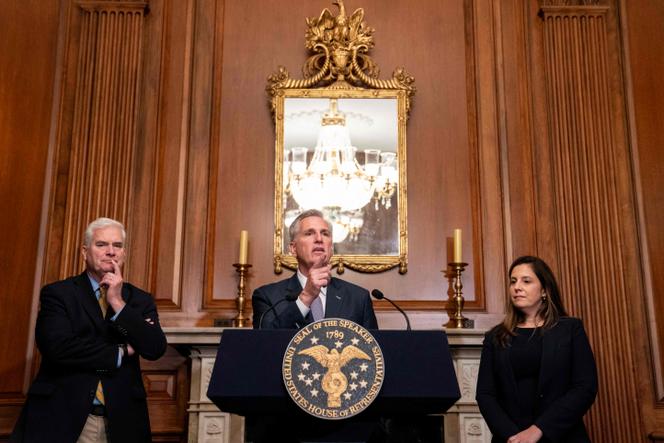


A disaster avoided, a 45-day breathing space gained, but a Ukraine symbolically abandoned. There were a number of different ways to analyze the improbable sequence that enabled the US Congress, in extremis, on Saturday, September 30, to avert a "shutdown" – a paralysis of the federal government's non-essential activities. The relief prevailing among most elected officials was tinged with bitterness. Nothing had been substantially resolved, meaning the drama was likely to recur 45 days later in mid-November, and parliamentary life was once again presented in its most unflattering light.
At the dawn of the last day before the dreaded deadline, and after exhausting all other options, Republican Speaker of the House of Representatives Kevin McCarthy agreed to what his radical base had up until then refused: a compromise, allowing Republican and Democratic votes to join forces. In mid-afternoon, by 335 votes to 91, thus uniting a large bipartisan majority, the House passed a text securing federal funding for 45 more days, which was then sent to the Senate. Additional funds ($16 billion, approximately €15.1 billion) were allocated to respond to natural disasters.
On the other hand, and this was a chilling lesson for Kyiv and European capitals, pressure from the Republican base led to the outright abandonment of any new aid package for Ukraine. After further discussion, the Senate confirmed the compromise that evening by 88 votes to nine. Just nine days earlier, President Volodymyr Zelensky had spent a morning on Capitol Hill, with representatives and senators from both sides of the aisle, pleading for increased aid in the midst of a counter-offensive, in the very name of American strategic interests. But the weight of an extremist, isolationist minority within the Republican Party, banking on growing public weariness with the war, undermined the bipartisan unity expressed since the start of the conflict.
On Saturday, the Republicans offered Vladimir Putin an unexpected gift, confirming his prejudices about the vulnerability of liberal democracies. "If we abandon Ukraine, that’s a change in policy and a decision to make Kyiv a Russian city and invite China to invade Taiwan," summed up Democratic Senator Chris Murphy (Connecticut) on X (ex-Twitter). The next six weeks will determine whether this is just a one-off short circuit or deeper damage. "We cannot under any circumstances allow American support for Ukraine to be interrupted," warned President Joe Biden in a statement issued by the White House that evening. "I fully expect the Speaker will keep his commitment to the people of Ukraine and secure passage of the support needed to help Ukraine at this critical moment."
You have 59.11% of this article left to read. The rest is for subscribers only.
